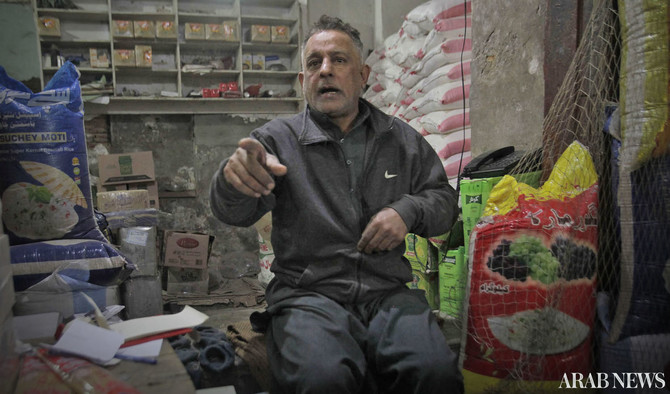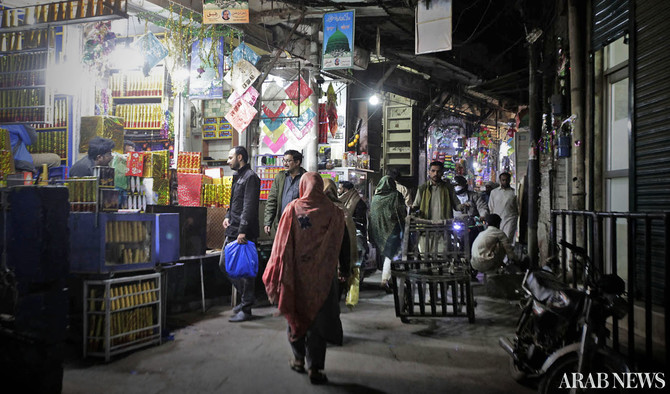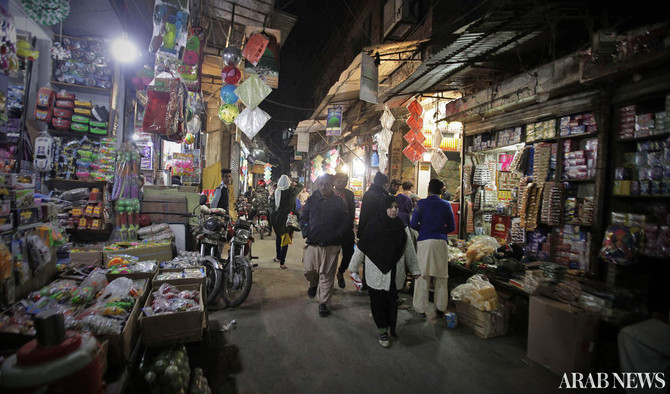LAHORE: Last December, Pakistan’s passionate kite-flyers rejoiced when officials announced that the boisterous spring festival of Basant, banned almost a decade and a half ago, would be celebrated once more this February.
But their excitement was snuffed out last week when the government gave up on plans to organize the springtime celebration, admitting that it needed more time to clampdown on manufacturers who lace string with chemicals and glass that makes its deadly.
Ironically, it is Pakistan’s kite-makers who have lobbied the government not to lift the ban on the kite carnival.
Kite-flying has long been a passion in South Asia and for decades, Basant would transform Pakistan’s skies into a glittery kaleidoscope of hundreds of thousands of kites to commemorate the advent of spring. But in 2005, the Supreme Court banned the celebration after 19 people died from decapitation by stray strings. In that year alone, kites and string worth over Rs.1 billion were sold on Basant day just in the eastern city of Lahore, whose ancient walled enclave is the epicenter of the festival.
Many kite-flyers indulge in kite duels, flying with thick strings or razor-sharp ones reinforced with glass and chemicals so that they can better attack the opponent’s kites and slice their strings. Stray strings have been known to knock out power lines and in some cases tangle around a human neck or limb and cut it.
“The government came to me for recommendations about opening Basant and I told them that first there should be a crackdown against those who are producing the prohibited thread,” Muhammad Siddique Papa, who comes from a long line of famous kite-makers, told Arab News outside what used to be his kite shop in Lahore’s ancient Mochi Darwaza. The store is now a warehouse rented out to local businesses.
“This thread is unbreakable and cuts like a sword,” Papa said. “I had recommended that the government should not allow Basant unless the production of this dangerous thread can be controlled. That has so far proved very difficult.”
Mochi Darwaza used to be a block-long market of tiny kite shops but since 2005, many of the kite sellers have shut down their stores or moved to selling grocery and toys.
Imran Butt, a former kite maker who now owns a grocery store in the walled city, said he had also recommended to the government that the ban on the festival should not be lifted.
“The government cannot ban the killer strings because black sheep of the thread industry will keep producing it,” he said as he poured rice into a bag for a customer. “I would not want Basant to open for the next thousand years because the government can’t control string makers for the next thousand years. They don’t have the capacity.”
Punjab information Minister Fayyaz ul Hasan Chohan admitted that rogue string manufacturers were the problem and said they produced the dangerous string “underground” and were not easy to identify.
“Some incidents of throat-cutting by kite-flying have occurred in different parts of the province in recent weeks and we felt that we need to prepare well to celebrate Basant,” Chohan said. “Preparations require a comprehensive strategy including new legislation and further training of police, which would take months. That’s the reason we have shelved the plan of celebrating Basant this year.”
Last week, the government had announced that it needed at least four to six months to prepare for a “safe Basant” and develop a mechanism to register all kite and string manufacturers.
“Strict action is required against the use of chemical and metallic twine,” Aleem Khan, provincial minister for local government, had said during a press conference.
But thread manufacture Muhammad Munir defended his industry, saying thick thread was made for industrial purposes but some string-makers misused it.
“Most of them import nylon thread from China or develop it at their own small home-based factories,” he said, adding that the government needed to crackdown on manufacturers from the city of Faisalabad, a popular Basant destination, who produced the dangerous thread and supplied it to the rest of the country.
“We have arrested dozens of string producers, sellers and kite-flyers only during the last two months and burnt thousands of spools of the banned string and hundreds of kilograms of confiscated thread,” Rashid Mehmood, a senior police officer in the city of Faisalabad, said.
On Lahore’s famed Lawrence Road, Shahbaz Butt sat at the shop of his late father Pervaiz Ahmad Butt, a legendary kite-flyer who won the 1979 All Pakistan Kite-Flying Tournament at the iconic Minto Park. Every Friday for decades, the city’s kite aficionados would head to the park to see Butt duel his rivals from around the country, knocking their kites down to the ground by slicing through their string.
“After the government stopped kite-flying, my father became a victim of depression and anxiety; his food habits changed and he lived the rest of his life between his home and our store,” Butt’s son said. The sign-board outside the car battery shop is shaped like a kite. “I believe if kite-flying had not been banned,my father would have been alive today.”
Octogenarian Hafeez Butt, who flew kites for 55 years and won several contests, said it took him years to get over the Basant ban.
“Kite-flying is a sport but greedy traders and unprofessional flyers turned it into an ugly hobby,” he lamented. “String-sellers are a mafia and the government cannot do anything against them. They should go after them instead of depriving us. They need to lift this ban.”
But Khawaja Basharat, who used to be the president of the now disbanded Pakistan Kite-Sellers Association, said he was relieved the ban had been extended.
“Criminal elements producing thick and killer thread have given us [kite flyers and makers] a bad name,” he said.
“I welcome the government’s decision of not celebrating Basant until they can eliminate the thread mafia,” he added. “When the government contacted me for help in reviving Basant, I told them, ‘I am no longer in this business’.”
No-Kite-Fly Zone: Pakistan’s kite-makers pushed to have Basant canceled
No-Kite-Fly Zone: Pakistan’s kite-makers pushed to have Basant canceled

- Festival too dangerous until government can crackdown on manufacturers of knife-sharp strings, say kite-makers
- Basant was banned by the Supreme Court in 2005 after stray strings killed 19 people
Pakistani finmin calls for reworking federal funding to provinces to reflect human development priorities

- Muhammad Aurangzeb identifies climate change, population growth as ‘existential issues’
- The minister calls for a ‘shift from infrastructure-heavy thinking to human capital investments’
ISLAMABAD: Federal Minister for Finance and Revenue Muhammad Aurangzeb on Thursday called for a rethinking of how federal funds are allocated to provinces, arguing that future disbursements should reflect human development indicators instead of just population size.
Speaking at an event organized by the Ministry of National Health Services in connection with World Population Day in the federal capital, Aurangzeb said Pakistan’s rapid population growth posed a serious challenge and must be addressed through coordinated, long-term policy interventions.
“As we move forward with revisiting and reviewing the NFC [National Finance Commission] award, the current allocation driver must be reconsidered,” he said while addressing the gathering.
“There are broader factors, such as human development indicators, which should be incorporated,” he added. “These can help shape a revised formula for how we divvy up resources between the federation and the provinces.”
The NFC is a constitutional mechanism that determines how financial resources are distributed from the federal government to Pakistan’s provinces. The existing formula primarily weighs population, though there are several influential voices within the government demanding that future formulas consider a broader range of development metrics.
The finance minister also noted Pakistan must confront two “existential issues” — climate change and population growth — if it wants to reach its long-term goal of becoming a $3 trillion economy by 2047.
“Just think about it: 40 percent of children under the age of five in this country are stunted,” he said. “If we don’t address this, there is no sustainable path forward.”
Aurangzeb noted the issue extended beyond food and sanitation, pointing to the need for birth spacing, women’s education and family planning awareness.
He also emphasized the scale of available resources for addressing these challenges.
Referring to Pakistan’s recently signed 10-year Country Partnership Framework with the World Bank, he said the agreement includes $20 billion in financing, with $600–700 million annually earmarked for population-related measures.
“We have a lot of funds already at our disposal, provided we find the right places to invest and prioritize them correctly,” he said.
Aurangzeb also argued that Pakistan’s total development spending across federal and provincial budgets exceeds Rs 4.2 trillion ($14.7 billion).
“The issue isn’t funding,” he said. “We must shift from infrastructure-heavy thinking to human capital investments.”
No discussion to oust Zardari, promote Pakistan military chief to presidency – minister

- Speculation has swirled over alleged plan to replace president through constitutional amendment
- Interior minister says rumor campaign backed by ‘hostile foreign agencies’ aims to destabilize leadership
KARACHI: Interior Minister Mohsin Naqvi on Thursday dismissed rumors that President Asif Ali Zardari is being pushed out of office or that army chief Field Marshal Asim Munir is eyeing the presidency, reiterating that there had been no discussion about such a change.
Media chatter about a possible constitutional amendment to replace President Zardari with someone else, potentially even the army chief, has gained traction in recent days. However, key political figures have swiftly rejected the notion.
“We are fully aware of who is behind the malicious campaign targeting President Asif Ali Zardari, Prime Minister Shahbaz Sharif, and the Chief of Army Staff,” Naqvi said in a post on X.
“I have categorically stated that there has been no discussion, nor does any such idea exist, about the President being asked to resign or the COAS aspiring to assume the presidency.”
The president maintains a “strong and respectful” relationship with the military leadership, Naqvi said, adding that the army chief’s “sole focus” was on Pakistan’s strength and stability. He warned those pushing this narrative in coordination with “hostile foreign agencies” to continue as they wished but vowed that the government would do “whatever is necessary to make Pakistan strong again, InshAllah.”
On Tuesday, the Pakistan Peoples Party (PPP) echoed Naqvi’s rebuke, with PPP Secretary General Nayyar Hussain Bukhari calling the rumors “baseless” and noting that the country’s federal government could not function without the PPP’s support.
“Zardari is the duly elected president of this country, and this system cannot function without him,” Bukhari said, dismissing the allegations as “uninformed and misleading.”
Irfan Siddiqui, a close aide to Prime Minister Sharif and a former senator, has also rejected the speculation, saying, “No such suggestion is under consideration at any level.”
Pakistan eyes $1 billion valuation in Roosevelt Hotel redevelopment plan

- Pakistan ready to part with minority stake in the prime Manhattan property, government official says
- Pakistan has said it will adopt a joint venture model for the hotel’s sale to maximize long-term value
KARACHI: Pakistan is seeking a valuation of at least $1 billion for the Roosevelt Hotel it owns in New York and is ready to part with a minority stake in the prime Manhattan property as it scouts for a redevelopment partner, a senior government official said.
Named after former US President Theodore Roosevelt, the century-old property in midtown Manhattan is seen as one of Pakistan’s most valuable foreign assets, which it acquired in 2000. Faced with mounting losses, the over 1,000 room hotel was shut in 2020, and has also operated briefly as a migrant shelter.
As part of the government’s $7 billion IMF-backed privatization push, Pakistan’s government approved a “transaction structure for the Roosevelt Hotel” on Tuesday , saying it won’t do an outright sale but has decided to adopt a joint venture model to maximize long-term value. It gave no further details.
The senior Pakistani official said the government will retain ownership in the project through an equity partnership, but declined to disclose the size of the stake being offered to any potential JV partner.
The official declined to be named since the process is confidential. JLL, or Jones Lang LaSalle, will run the process and the government is eyeing a valuation of over $1 billion for the 42,000 square feet property it hopes could be redeveloped for residential-cum-office use, the official said.
“It is among the best pieces of land in NY real estate ... The process begins immediately and is expected to be completed in the next six-nine months,” said the official.
Pakistan’s Privatization Ministry and state-owned Pakistan International Airlines (PIA), which owns the hotel through its investment arm, did not respond to request for comments, and neither did JLL.
Pakistan this week also approved four parties to bid for a stake in debt-ridden PIA.
The hotel is located near marquee New York destinations such as Grand Central Terminal, Times Square, and Fifth Avenue, placing it in one of Manhattan’s most valuable commercial zones.
Pakistan’s government is estimating the redevelopment will take 4–5 years, the official said, adding the “interest level is extremely high.”
In June, the government said it expects $100 million in the initial payment from the joint-venture partnership by June 2026.
Pakistani minister calls Israel ‘illegal state,’ rules out recognition

- Statement follows social media debate over Pakistan’s possible alignment with the Abraham Accords
- Religious affairs minister says Pakistanis are ‘deeply wounded’ by Israeli bombings on civilians in Gaza
ISLAMABAD: Pakistan’s Minister for Religious Affairs, Sardar Muhammad Yousaf, on Thursday ruled out any possibility of recognizing Israel, calling it an “illegal state” during a meeting with Palestinian envoy Dr. Zuhair Muhammad Hamdallah Zaid, as he reaffirmed his country’s longstanding position on the issue.
The comments come amid a debate on social media over whether Pakistan might be moving closer to joining the Abraham Accords, a US-brokered framework that has seen several Muslim-majority countries normalize relations with Israel since 2020.
The speculation was stirred in the wake of the recent high-level engagements between Pakistani officials and members of US President Donald Trump’s administration.
“There has never been, and will never be, any recognition of Israel,” Yousaf said during the meeting, according to a statement by the religious affairs ministry. “Israel is an illegal state, and Pakistan has always condemned its oppression of the innocent Palestinian people.”
Pakistan has continued its vocal criticism of Israeli policies in recent weeks, especially in light of Tel Aviv’s military operations in Gaza and recent clash with Iran.
“We are deeply wounded by the bombings on defenseless civilians, especially children and women, in Gaza,” the Pakistani minister continued, adding that his country would “continue to raise its voice to awaken the conscience of the international community.”
Yousaf also called for the Palestinian issue to remain a top priority on the agenda of the Organization of Islamic Cooperation (OIC).
Ambassador Zaid praised Islamabad’s “consistent and selfless” support and noted that many Palestinians serving in key positions had studied in Pakistan.
He reiterated the Palestinian people’s resolve to “sacrifice their lives, wealth and families” for the liberation of their land from Israeli occupation.
He informed that Dr. Mahmoud Al-Habbash, adviser to Palestinian President Mahmoud Abbas, was expected to visit Pakistan soon, accompanied by the imam of Al-Aqsa Mosque.
PM invites Qatari climber, Pakistan’s new tourism ambassador, to return for future expeditions

- Sheikha Asma Al Thani recently became first Qatari woman to summit Nanga Parbat
- Sharif hails her role in highlighting Pakistan’s mountain beauty, empowering young women
ISLAMABAD: Prime Minister Shehbaz Sharif on Thursday invited Qatari mountaineer Sheikha Asma Al Thani, recently appointed as Pakistan’s brand ambassador for mountain and adventure tourism, to return to the country for future expeditions.
Al Thani, who became the first woman from Qatar and the Gulf to summit Nanga Parbat earlier this month, met the prime minister in Islamabad where he praised her courage and her contributions to global awareness of Pakistan’s natural beauty.
“The prime minister congratulated her for being the first woman from Qatar and the Gulf to successfully summit Nanga Parbat,” the PM Office said in a statement.
“He appreciated Sheikha Asma’s extraordinary courage and commitment in achieving this milestone and praised her efforts to promote awareness around empowering women, especially young women, through adventure sports.”
The prime minister noted that five of the world’s fourteen highest peaks are in Pakistan, calling it a “matter of pride” that positions the country as a key destination for climbers worldwide. He also thanked Al Thani for selecting Pakistan’s mountains and “drawing international attention to their challenges and natural beauty.”
“He extended best wishes to Sheikha Asma in her mission to summit all fourteen 8,000-meter peaks and invited her to return to Pakistan to further explore the country’s diverse and breathtaking landscapes.”
The prime minister acknowledged the vital contribution of Pakistani porters and guides in enabling international climbers to pursue their goals, and reaffirmed the government’s commitment to ensuring their safety, support and hospitality.
He also expressed interest in strengthening Pakistan-Qatar cooperation in areas such as sports, youth engagement and adventure tourism.
“The prime minister appreciated Sheikha Asma’s active role as Vice President of the Gender Equality Commission in creating equal opportunities,” the statement said.
During the meeting, Al Thani expressed gratitude for the hospitality she received during her climbs, and praised the local porters and guides who assisted her on Nanga Parbat and other summits.
She also highlighted the experience of climbing K2, which she had summited previously.
“It is the best of all the peaks I’ve climbed,” she was quoted as saying in the statement. “Its beauty is unmatched.”
















